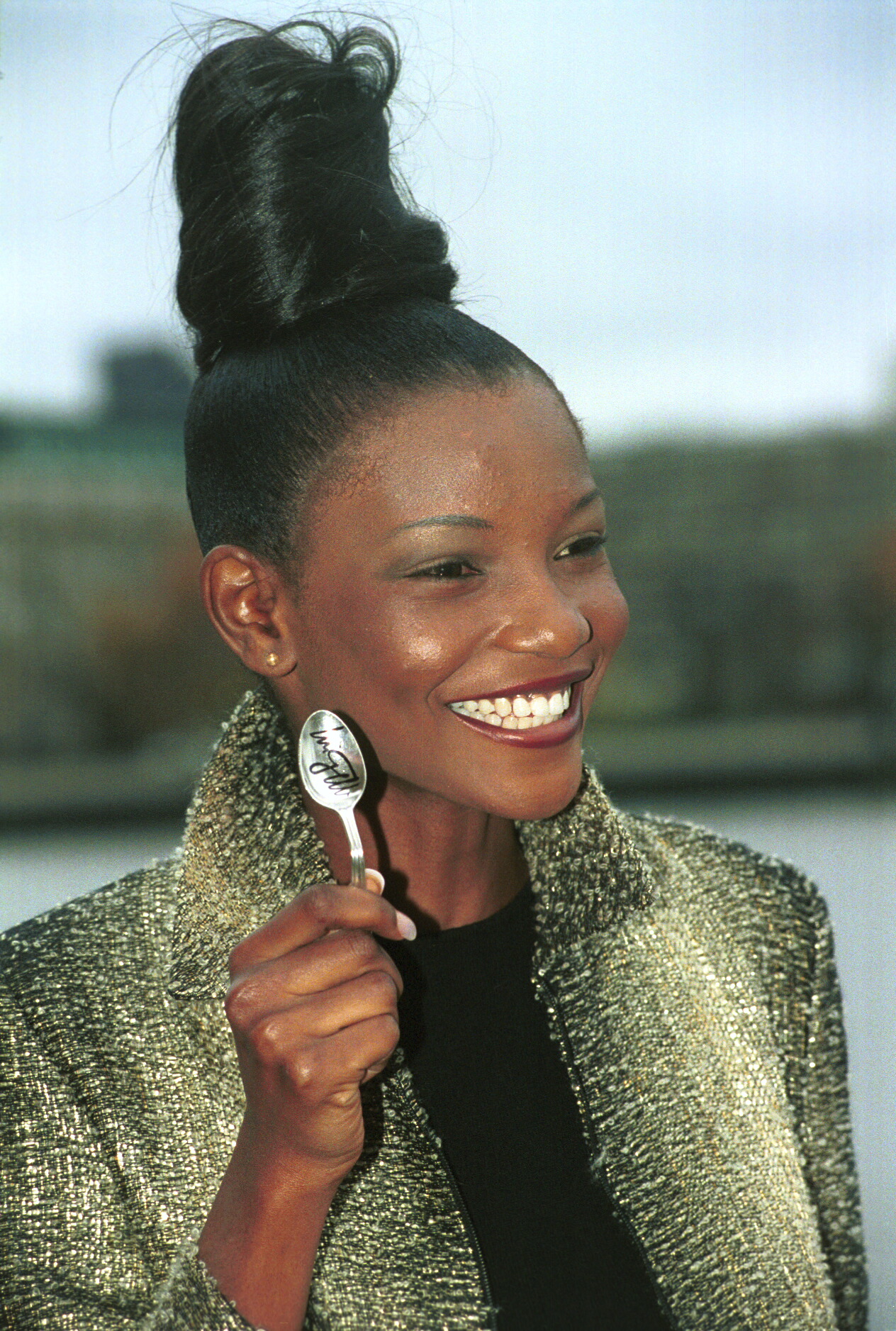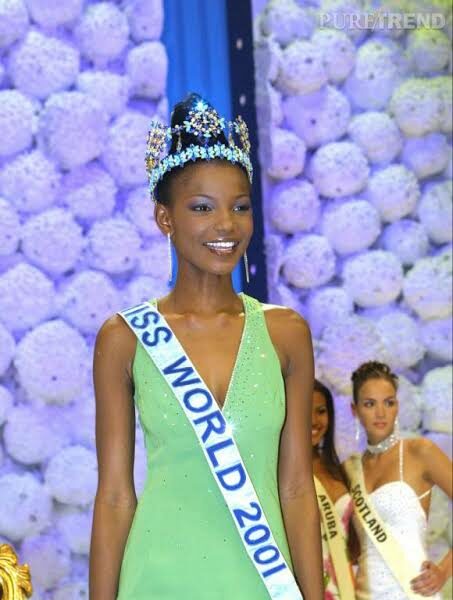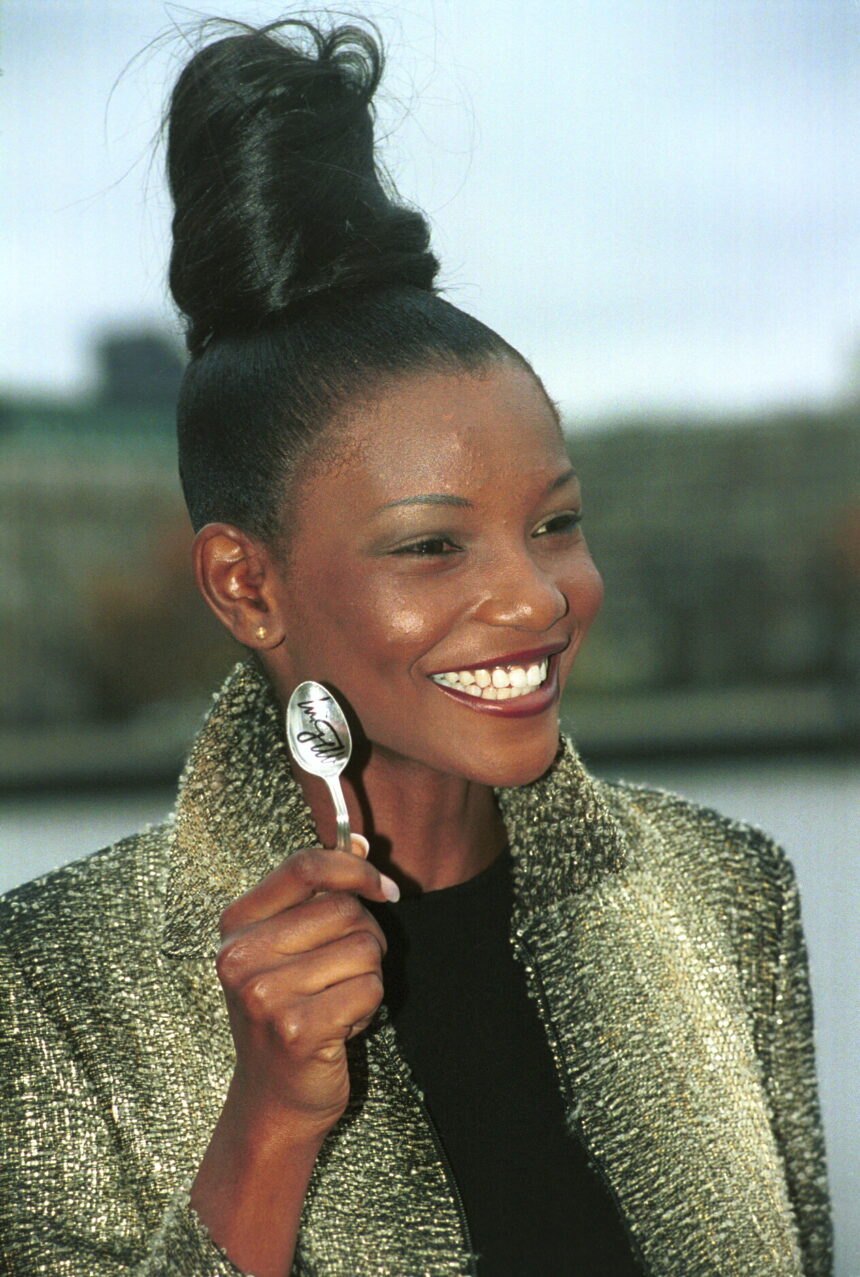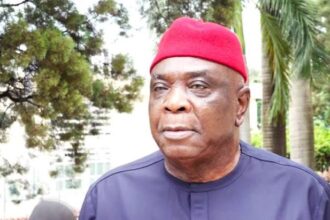The lights were too bright, the music too loud, and yet silence seemed to pool under the surface of that London ballroom in November 2001. A hundred cameras leaned forward as though eager to bite history. Rows of polished faces waited, sequins sparkling like tiny galaxies stitched to dresses. The tension was thick enough to weigh on the air, as if the world itself paused to hear a verdict.
- Before the Crown: The Making of Agbani Darego
- Miss World 2001: A Night in History
- Carrying a Continent on Her Shoulders
- The Personal Cost of Public Iconography
- The Weight of Being the First
- The Woman Behind the Crown
- The Cultural and Historical Impact
- Legacy and Reflection
- Closing Thoughts: The Jewel and Weight
In the audience, whispers swirled—was this the year Africa would finally cross the line between contender and conqueror? It had been forty-nine years since the Miss World crown was first placed on a head, and never once had the weight of that tiara rested on the brow of a woman from Africa.
Then came the announcement, spoken with a cadence that could fracture time: “And the winner of Miss World 2001 is… Nigeria!”
In that instant, the room exploded. History was rewritten with the grace of one woman: Agbani Darego, a twenty-one-year-old from Rivers State, Nigeria, who had carried more than beauty to that stage. She had carried a continent.

But what no one knew—what even she could not have prepared for—was the price of being the “first.” For every applause that night, a shadow followed her into the years beyond: the shadow of expectation, of judgment, of a continent’s hopes stitched to her crown.
Before the Crown: The Making of Agbani Darego
To fathom Agbani Darego’s story is to trace the quiet resilience of a girl who knew loss early and yet learned to wear dignity like armor. Born Ibiagbanidokibubo Asenite Darego on December 22, 1982, in Abonnema, Rivers State, her very name carried length and poetry—reflecting the cadence of her Kalabari heritage. She was the sixth of eight children in a middle-class family whose values tilted toward education and discipline.
Her father, a customs officer, was firm but supportive, instilling in his children a sense of duty. But it was her mother, Inaewo Darego, who marked Agbani most deeply. Inaewo owned a boutique, moving in fabrics, colors, and style—a world that would one day echo in her daughter’s career. She encouraged her children to carry themselves with quiet pride, even when life carved at them.

Then came the rupture: when Agbani was only twelve, her mother was diagnosed with breast cancer. Treatments came, hope came, but the illness persisted until death finally claimed her. That loss carved into Agbani’s childhood like a storm through fragile glass. To cope, she built a kind of stillness inside herself, a calm surface that hid deep currents of strength.
School became her refuge. At Federal Government Girls’ College in Abuloma, she stood out—not only for her height and elegance but also for her seriousness. Teachers often described her as disciplined, almost withdrawn, as if she lived with an invisible burden.

Later, at the University of Port Harcourt where she briefly studied Computer Science, she carried that same aura: a young woman who seemed both present and elsewhere, both grounded and reaching.
Yet the world outside her classrooms whispered other possibilities. Nigeria’s beauty pageant culture was shifting in the late 1990s. The Most Beautiful Girl in Nigeria (MBGN), founded in 1986, had become the nation’s gateway to global contests like Miss World and Miss Universe. For many young women, it was a dream wrapped in glamour. For Agbani, it was an opening into a world larger than grief, a chance to step beyond her own silence.
Miss World 2001: A Night in History
London in November carries a certain dampness, the kind that makes the city’s lights smear like watercolor against the night sky. On November 16, 2001, those lights converged at the Millennium Dome—later renamed The O2 Arena—where the 51st edition of the Miss World pageant unfolded.
It was a peculiar time in global history. Barely two months earlier, the September 11 attacks had altered the mood of the entire planet. Borders were tighter, suspicions heavier, and the very notion of global togetherness felt fragile. Yet here was Miss World, a contest that paraded unity and glamour, drawing 93 contestants from across the globe.
Amid that sea of sequins and practiced smiles was a tall, willowy Nigerian with striking poise. Agbani Darego stood out, though not in the predictable way. Unlike the heavily stylized contestants, her beauty carried restraint—elegant but not theatrical, assured but not overwhelming. For the judges, it was a refreshing presence. For Nigerians watching back home, it was a chance to believe in a narrative bigger than football or oil.
The competition thinned as rounds passed: evening gowns, swimsuit showcases, interviews. Agbani advanced with steady grace, surprising commentators who had long assumed Miss World crowns belonged to Europe, the Americas, or occasionally Asia. Africa had flirted with near-victories, but the crown itself had remained elusive.
Then came the final announcement.
Five finalists stood frozen under the lights: Miss Aruba, Miss Scotland, Miss Nigeria, Miss China, and Miss United States. The announcer’s voice sliced through the suspense: fourth runner-up, third, second… and suddenly only two remained. The crowd roared when the host finally spoke the words:
“And the new Miss World is… Nigeria!”

For a moment, the ballroom erupted in disbelief and joy. Nigerians at home burst into celebrations that spilled from living rooms to streets. On CNN and BBC, headlines shifted: Africa had its first Miss World.
Agbani Darego stood on that stage as the crown touched her head, her eyes wide but her posture steady. She smiled, yes, but her expression carried more: a quiet weight, as though she instinctively understood this was not merely about beauty. She had become a symbol.
Carrying a Continent on Her Shoulders
For many, Miss World is a fleeting moment—an evening of glamour, media appearances, and perhaps some charitable work. For Agbani, it became a life-altering responsibility. Every gesture, every smile, every word she spoke was interpreted as a reflection of Africa. Miss World was not just a contest for her—it was a platform where she embodied an entire continent’s image.
In interviews, journalists subtly questioned her African identity: Would she conform to Western expectations of elegance? Would she represent African culture authentically? Would she validate or challenge stereotypes? The scrutiny was subtle yet relentless. She had no predecessors in her position; there was no blueprint for how an African Miss World should navigate global attention.
Even back home in Nigeria, the expectations were immense. Newspapers heralded her as a national hero, a cultural milestone. Young women were inspired, yes, but that adoration carried its own weight: she was expected to be perfect, poised, unflappable. One misstep could be magnified as a reflection not of a single individual but of the continent itself.
The Personal Cost of Public Iconography
Behind the glitz and gowns, Agbani was still a young woman grappling with private grief. Losing her mother at twelve had shaped her early life, instilling resilience but also a quiet sensitivity. Suddenly, the world demanded constant visibility, public appearances, and smiling composure. Balancing private vulnerability with the polished public persona required a strength few could appreciate.
She pursued modeling contracts, international travel, and public speaking, yet each step meant negotiating the fine line between personal autonomy and public duty. For every moment of triumph, there was a subtle tension: How much of herself could she reveal without compromising the image she now symbolized?
The Weight of Being the First
Being the first in history is as much a burden as it is an honor. Unlike those who follow, Agbani had no roadmap, no predecessors to guide her. She was setting a standard, whether she wanted to or not. Every succeeding African contestant would be measured against the benchmark she had established. Every misstep or success in the continent’s future representation in pageants would be contextualized against her legacy.
This pressure extended beyond pageantry into fashion, media, and cultural discourse. The global industry often exoticized her presence, framing her win as an anomaly rather than a rightful recognition of talent and beauty. She faced the delicate task of navigating praise and critique, opportunity and objectification, all while maintaining her integrity and personal vision.

The Woman Behind the Crown
Public figures often become trapped in their symbols. For Agbani Darego, the Miss World crown was both an achievement and a cage. To the world, she was the first African Miss World; to herself, she was still a daughter who had lost her mother too soon, a woman navigating adulthood with both grace and guardedness.
I) A Life of Deliberate Privacy
Unlike many beauty queens who parlay their fame into nonstop media presence, Agbani chose a different path. She valued privacy. She married quietly to Ishaya Danjuma, the son of Nigerian billionaire Theophilus Danjuma, and together they built a family largely shielded from public intrusion.
Her decision to keep her personal life out of tabloids was intentional, a way of reclaiming agency from the crown that had once consumed her identity.

II) Entrepreneurship and Independence
Beyond her reign, Agbani channeled her influence into business. Her fashion line, AD by Agbani Darego, was not merely a vanity project. It represented her vision of African women dressing with dignity and modernity. The line included denim, dresses, and ready-to-wear outfits crafted for real women—not just the runway elite. By building her own label, she inverted the dynamics of beauty: no longer just the face of campaigns, she became the architect behind them.
III) Resilience Beyond Glamour
Behind her calm exterior lies a thread of resilience. Losing her mother as a teenager instilled in her a profound understanding of impermanence. The Miss World crown did not erase that grief; if anything, it sharpened her awareness of how fleeting applause can be. Perhaps this is why she refused to be intoxicated by fame. Instead, she approached it with caution, recognizing it as both opportunity and trap.
Her story, then, is not simply about glamour. It is about how a young Nigerian woman balanced the glare of global fame with the quieter needs of personal dignity.
The Cultural and Historical Impact
When the crown settled on Agbani Darego’s head in 2001, it was more than a personal victory. It was a cultural event that altered the trajectory of beauty representation in Nigeria and across Africa. For decades, African beauty queens had been relegated to the margins of global contests, often overshadowed by contestants from Europe and the Americas. Agbani’s win disrupted that hierarchy.
I) Redefining Beauty Standards
One of the most enduring legacies of her triumph was the redefinition of beauty standards. Before Agbani, global pageantry leaned heavily on Eurocentric ideals—pale skin, narrow features, and hair textures that aligned with Western aesthetics. Her success forced both judges and audiences to reconsider what global beauty could mean.
For young African women, the impact was immediate. Suddenly, they could see themselves in her: dark-skinned, natural, elegant without artifice. She was not an imitation of Western ideals but an affirmation of African beauty on its own terms. This ripple extended beyond pageants. In fashion magazines, on billboards, and in advertising campaigns, there was a gradual, if reluctant, shift toward inclusion.
II) Nigeria’s Pageant Renaissance
In Nigeria, her win sparked a surge of interest in beauty pageants. The Most Beautiful Girl in Nigeria competition gained unprecedented prestige, as young women now saw it as a credible gateway to international recognition. Sponsors, media houses, and entertainment stakeholders began to invest more heavily in the pageant scene, recognizing its potential to produce global icons.
This renaissance was not without controversy. Critics argued that pageants still commodified women’s bodies, reinforcing patriarchal expectations. Yet even those critiques acknowledged that Agbani’s victory had shattered a ceiling. She had become proof that Nigerian women could not only compete on the global stage but win outright.
III) Global Media Narratives
Agbani’s win also shifted media narratives about Africa. For decades, Western headlines had painted the continent in terms of famine, war, and poverty. In contrast, here was a young Nigerian woman embodying elegance, intelligence, and global appeal. Her story forced a reevaluation of Africa—not as a perpetual site of crisis but as a source of talent, resilience, and beauty.
Of course, the media’s gaze was not entirely unproblematic. Some outlets exoticized her, framing her win as an anomaly rather than a long-overdue recognition. Still, even within those frames, her presence disrupted entrenched stereotypes. She had expanded the vocabulary of representation.
Legacy and Reflection
Two decades have passed since that November night in London, but the echoes of Agbani Darego’s victory remain. She has become less a headline and more a symbol, less a celebrity and more a cultural reference point. Her name is now spoken in the same breath as milestones in Nigerian history: the first Olympic gold medal, the first Nobel Prize, the first African Miss World.

I) A Symbol for Generations
For young women across Africa, her story continues to resonate. She represents the possibility of defying narrow definitions, of stepping into spaces where Africans had long been excluded. She showed that beauty, intelligence, and dignity could belong fully to an African woman on the global stage.
II) The Unfinished Journey
And yet, her singularity raises questions. Why has Africa not produced more Miss World winners since? Why does representation still feel like an exception rather than a norm? These questions highlight the structural inequalities that persist in global beauty and fashion industries. Agbani’s win was a breakthrough, but breakthroughs do not always dismantle systems. Sometimes, they only expose how entrenched those systems are.
III) The Crown as Burden and Blessing
In the end, Agbani Darego’s story is one of paradox. The crown brought her global recognition but also weighty expectations. It gave her a platform but also defined her in ways she continually had to resist. She wore it with grace, but she also knew it was never light.
Her legacy is not just that she was the first African Miss World. It is that she bore that burden with quiet dignity, carving a path for those who would follow, even if the crown has yet to return to the continent.
Closing Thoughts: The Jewel and Weight
Crown. The word itself carries contradiction. It is both jewel and weight, ornament and responsibility. To wear a crown is to shine and to bear. Agbani Darego’s story is the perfect embodiment of that paradox.
She was crowned Miss World in 2001, and in that moment, she became more than herself. She became Africa’s daughter, Nigeria’s pride, and the world’s unexpected queen. But along with the applause came expectation, scrutiny, and burden. For every girl inspired, there was a voice asking her to be perfect. For every celebration, there was pressure to carry a continent’s hopes.
And yet, she bore it. Quietly, gracefully, sometimes invisibly, she carried that crown beyond the stage, beyond the year of her reign, into a life she shaped on her own terms. She refused to be consumed by celebrity. She chose dignity over drama, substance over spectacle.
Two decades later, we remember not just that she won, but how she lived afterward: balanced, intentional, resilient. She remains proof that the first can also be the lasting, that history can be written not with noise but with quiet strength.
Agbani Darego’s crown was never just a tiara of gems. It was a symbol of history bending, a weight of representation, and a mirror in which Africa glimpsed its own beauty. It was heavy, yes—but she wore it in a way that made it light enough for others to dream.













